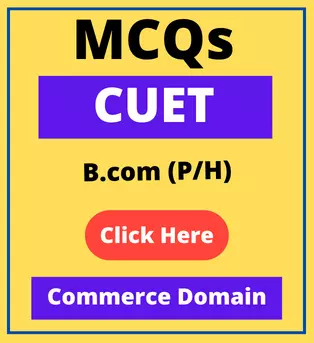Matching Type MCQs of Organising Business studies class 12
Looking for Matching Type MCQs of organising chapter with answers of Business studies class 12 CBSE, ISC and other state Board.
We have compiled important Multiple Choice Questions of organising chapter with answers of Business studies class 12.
Matching Type Multiple Choice Questions of Organising chapter with answers of BST class 12
Let’s Practice
From the set of statements given in Column I and Column II, Choose the correct pair of statements.
| Column – I | Column – II |
| A – Functional Structure | i) it is costly as all resources are required in each department. |
| B – Divisional Structure | ii) It leads to functional specialization. |
| C – Formal Organisation | iii) It specifies the reporting relationships among various job positions |
| D – Informal Organisation | iv) It places more emphasis on structure and work. |
Options
a) A – i)
b) B – ii)
c) C – iii)
d) D – iv)
Ans – c)
Match Column I (Steps in the Process of Organising) with Column II
| Column – I | Column – II |
| A – Identification and division of work | i) Allocation of work as per the competence of employees. |
| B – Departmentalisation | ii) Creation of accountability |
| C – Assignment of duties | iii) Grouping of similar tasks |
| D – Establishing authority responsibility relationship | iv) Avoiding duplication of work and sharing burden. |
Options
a) A – ii), B – i), C – iv), D – iii)
b) A – ii), B – i), C – iii), D – iv)
c) A – iv), B – iii), C – i), D – ii)
d) A – iii), B – iv), C – i), D- ii)
Ans – c)
Match the statements given under A with the correct options given under B.
| Column – A | Column – B |
| i) Delegation of Authority | A – Decision-making authority is shared with lower levels |
| B – there is a downward transfer of authority from a superior to a subordinate. |
Options
a) i) – A
b) i) – B
Ans – b)
Match the concept of management in Column I with their respective explanation in Column II.
| Column – I | Column – II |
| A – Organisation structure | i) Number of subordinates under a superior. |
| B – Decentralisation | ii) The framework within which managerial and opening tasks are performed |
| C – Span of Management | iii) An optional policy decision of the top management |
Options
a) A – i), B – ii), C – iii)
b) A – i), B – iii), C – ii)
c) A – ii), B – iii), C – i)
d) A – iii), B – ii), C – i)
Ans – c)
Match the statements given under A with the correct options given under B.
| Column – A | Column – B |
| i) Formal Organisation | A – It arises out of personal qualities |
| ii) Informal Organisation | B – It arises by virtue of position in management. |
Options
a) i) – A, ii) – B
b) i) – B, ii) – A
Ans – b)
Match the items given under A with the suitable statements under B:
| Column – A | Column – B |
| i) Formal Organisation | A – Concentration of all decision making functions at the apex of the management hierarchy. |
| ii) Functional Structure | B – Organisation structure designed by management to accomplish a particular task. |
| iii) Centralisation | C – Organisational design that groups similar or related jobs together. |
Options
a) i) – B, ii) – C, iii) – A
b) i) – A, ii) – A, iii) – B
c) i) – C, ii) – B, iii) – C
Ans – a)
Match the concept of management in Column I with their respective explanation in Column II
| Column – I | Column – II |
| A – Authority | i) It refers to the right to take decisions inherent in a managerial position to tell people what to do and expect them to do. |
| B – Responsibility | ii) Obligation of a subordinate to properly perform the assigned duty. |
| C – Accountability | iii) Answerability for the final outcome of the assigned task. |
Options
a) A – i), B – ii), C- iii)
b) A – i), B – iii), C – ii)
c) A – ii), B – iii), C – i)
d) A – iii), B – ii), C – i)
Ans – a)
Match the items given under A with the suitable statements under B.
| Column – A | Column – B |
| i) Divisional Structure | A – Downward transfer of authority from a superior to a subordinate. |
| ii) Delegation of Authority | B – Jobs related to one product are grouped under one department. |
| iii) Informal Organisation | C – Delegation of all decision making functions to the lower level of the hierarchy |
| iv) Decentralisation | D – Network of social relationships among employees. |
Options
a) i) – B, ii) – A, iii) – D, iv) – C
b) i) – A, ii) – B, iii) – C, iv) – D
c) i) – C, ii) – B, iii) – A, iv) – D
d) i) – D, ii) – C, iii) – B, iv) – A
Ans – a)
Match the following
| Column – I | Column – II |
| A – Divisional Structure | i) Downward transfer of authority |
| B – Delegation of authority | ii) Same product working are grouped under the same department. |
| C – Decentralisation | iii) Delegation till lower level. |
Options
a) A – ii), B – i), C – iii)
b) A – i), B – ii), C – iii)
c) A – iii), B – ii), C – i)
d) A – ii), B – iii), C – i)
Ans – a)
Match the following.
| Column – I | Column – II |
| A – Leads to specialisaiton | i) Delegation |
| B – Functional and divisional | ii) Step of organising Process |
| C – It has narrow scope | iii) Importance of organisation |
| D – Reporting relationship | iv) Types of organisation structure |
Options
a) A – i), B – ii), C – iii), D – iv)
b) A – ii), B – iii), C – iv), D – i)
c) A – iii), B – iv), C – i), D – ii)
d) A – iv), B – i), C – ii), D – iii)
Ans – c)
Match the columns.
| Column – I | Column – II |
| A – The framework within which managerial and operating tasks are performed | i) Decentralisation |
| B – The granting of authority to subordinates | ii) Organisation Structure |
| C – The systematic granting of authority to the lowest level | iii) Divisional Structure |
| D – The structure which is formed on the basis of product specialisation | iv) Delegation of Authority |
Options
a) A – ii), B – iv), C – i), D – iii)
b) A – i), B – ii), C – iii), D – iv)
c) A – ii), B – i), C – iii), D – iv)
d) A – iv), B – iii), C – ii), D – i)
Ans – a)



